I referenced some thoughts on fiction in last week’s post, but yesterday I finished Daniel Nayeri’s Everything Sad is Untrue and I can’t stop thinking about it. The way he crafts his story is compelling, honest, heartbreaking and redemptive. But what struck me most was his grappling with his own limited ability to tell the truth, despite the desire to do so. This honesty hit me hard, because it resonates so strongly with parts of my own story.
One of the most influential frameworks I’ve encountered in the last decade is Dan Allender’s concept of “story work”. In simple terms, this is the idea that all of us have a story, and that as we reflect on current struggles, there will be themes and thread that play out throughout our lives. As much as we want to pretend we can move on with our adult lives, starting fresh, or starting over, our current reality will be always filtered through our story, and to the extent that we make sense of our story — even if it means naming the parts that don’t make sense — we begin to see more of the truth of what we’re living now.
In a podcast discussion on the topic, Cathy Loerzel puts it like this:
[W]hen I think about story outside of what happened to you, it’s the idea that we understand ourselves based on the combined and the individual story of what it means to be human. And so all of our stories, if you tell a good story about your life, it’s both true and not true, but it’s always true on the inside. And so when I look at stories, and this may not be helpful, but I think the way we understand our lives is by understanding, like Dan said, the theme, what does your life story look like? What’s the trajectory? What is the feeling behind it?
We are not one dimensional characters, and so, like any good literary analysis, making sense of our own current reality, requires an understanding of some of the elements of our life. Do we understand the setting ? What about the character’s motivations? Is there a tone or mood that influences the story? What drives the plot? Any compelling character has a well developed backstory, even if the reader isn’t consciously aware of it. In fiction, like in life, the “work” of understanding the character is often not seen, but is always felt.
Daniel Nayeri’s brilliant portrayal of a child grasping for orientation in the midst of swirling trauma is a gift to us all. We hear his classmate’s interjections, the ways that he doubts himself as he puts the puzzle pieces together, the way he is trying to make sense of the story as he’s telling it, wondering all the while if he’ll lose these memories.
Nayeri references the idea that a “patchwork story is the shame of a refugee” several times throughout the book, and I can’t help but think of what I know of traumatic memory, amnesia, and the fragmentation caused by trauma. When you can’t go back, do you ever get to know the truth for sure? The humility in his story is disarming; there is nothing gratuitous in the telling. He does not shock for the sake of attention or expose for revenge. When I listened to the Reading Revisited podcast preview of the book, Heidi White referenced the fact that Daniel is a “healed man”. He is a man who has learned his own story, in order to tell it well.
For all the Christian literature that tries to convince us healing is a linear series of steps, the true stories of real people disprove that theory. Perhaps we can pretend this linear approach works, when we read pedantic literature that teaches a lesson instead of telling a story. We all know these books when we see them, and most of us dislike them. These are the books which shove tidy lessons down children’s throats, encouraging them to regurgitate moral therapeutic deism as “good girls” and “good boys”. These are the books whose heroes have no flaws, and whose villains are never likable. These are the books that crush suffering people’s souls.
Are we trying to make our lives like one of these moralistic books when we write about it? Do we tie things up in tidy bows, or close narrative loops because we feel the need to leave our readers hopeful? Do we overstate the flaws of those who’ve harmed us, and understate our own complicity? Are we trying to protect God? Or do we try to, as C.S. Lewis said, “to tell the truth (without caring twopence how often it has been told before)”1 The temptation in writing, and in life, is to avoid feeling foolish, to avoid talking about things because we can only do so imperfectly, or to fall into easy binaries where we are all good, and they are all bad. Everything is our fault. Nothing is our fault. The very first post I wrote on Substack traced this theme, and it’s one I’ve been thinking about for the last several years.
I often think of the narrative structure of the book of Job when I think about how to make sense of suffering in our stories. The use of dramatic irony in the development allows us to see behind the curtain. We know that Job is a righteous man, and yet God allows these terrible things to befall him. We are never allowed to know the full explanation, only that God permitted, but did not cause, and that He decreed the extent of the evil. We see the ways people try to make sense of Job’s suffering and bludgeon him with advice, and we see that, while he is innocent in the sense that he does not cause his suffering, he is not wholly right in his understanding of it, either.
Job tells God his story as he sees it, and God responds back with the Story as it is. The honesty of the complaint is honored in the response, because Job comes to God with both the trust to complain, and the humility to be answered.
As I read good stories this last month I found it was not the absence of suffering or complication that made them good. The stories that lodged in my heart did not do so because they said the right things, but because they troubled me enough to ponder them, and in doing so, I honored both the story and myself. Reading other people’s stories keeps taking me back to my own. As much as I might want to escape into fiction, everything I’ve picked up in the last month has taken me away only to bring me back home.
Perhaps that is the whole point of a Story.
Introducing…. The Children’s Literature Corner
I’ve spent a lot of time feeling a little inadequate about my reading life, and while there’s parts of this that are true (hello shortened attention span as a result of the Internet) there's another factor to which I have not given much credit. In all these years I haven’t been reading novels, I have been reading stories. Stories upon stories in the form of children’s picture books. For all the reasons I’ve talked about above, but so many more besides2, I cannot overstate the importance of reading our children good stories. I don’t mean “Christian” stories, but true stories. The quote that got me thinking about this idea of story in the first place is from a Patricia Polacco book called, My Rotten Red-Headed Older Brother. Like many of Polacco’s books, it features a Bubbie — a grandma who tells stories from her homeland, and when her grandchildren ask her, “Bubbie, is that true?” she answers, “Of course is true, but it may not have happened!”
Isn’t this the way it is with all good stories?
So, in the interest of making your library3trips just a bit nicer, I’ll be trying to talk about a book or children’s author we love each week. I polled my kids — ages 6 months - 11 years old, for their favorites and they had so many suggestions I decided to make it a series instead of a single post. I was thrilled to hear them talk about the books they wanted me to share4.
Because of our age spread and the fact that I’ll have a mobile baby5, I also am focusing more on picture books — biographies and otherwise — that we’ll all enjoy together this school year. I just want to read stories with my people, and that’s what we’re going to do. But don’t worry, I have some ideas for how to use the stories to teach them a few things, all sneaky like, so I’ll talk a bit about that too. I’m envisioning this being a quick blip in the weekly newsletter, but it sounded fun for me, and useful for you. Thoughts? Children’s literature is literature too!
This letter is free for you to read, but costs time and brain cells to write. If you’d like to support this work please like it, leave me a comment, or share with a friend. I’m so glad you’re here!
If you know of someone that might appreciate this essay or enjoy my writing, would you take a moment to shoot it to them in a text or forward this e-mail? Word of mouth remains the best way for writers and readers to find each other and it also keeps me from wasting time in social media feeds, which helps me think better thoughts to write here.
If you’d like to have full access to the archives and contribute to our homeschool curriculum purchases, you can upgrade to a paid subscription.
And, if you’d like to cheer me on, but can’t commit to a paid subscription, you can buy me a cup of coffee here… I understand that some folks prefer a one time commitment, so you’ll receive a “thank you” from me in the form of 1 month of access to the archives!
If you’re new here, you won’t know that I used to have another publication called, “The Everything Free Life”. While life decreed that project be put on hold, I do have some great health and food related content in the archives. A few you might enjoy perusing:
And, since I’ve been writing here for a few years, I’ve talked about mid summer malaise and homeschool planning overwhelm a few times:
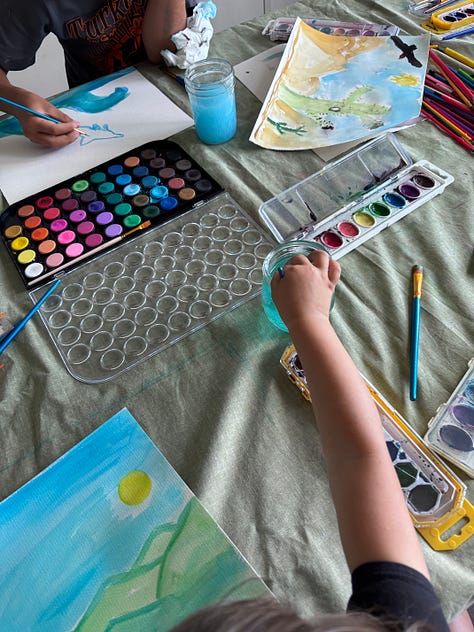


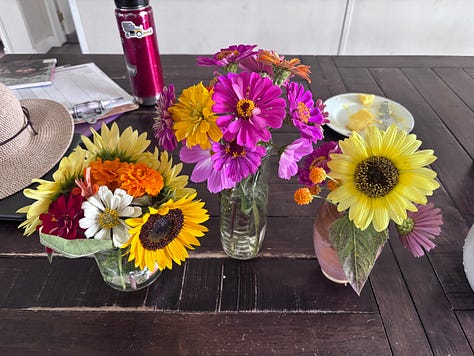


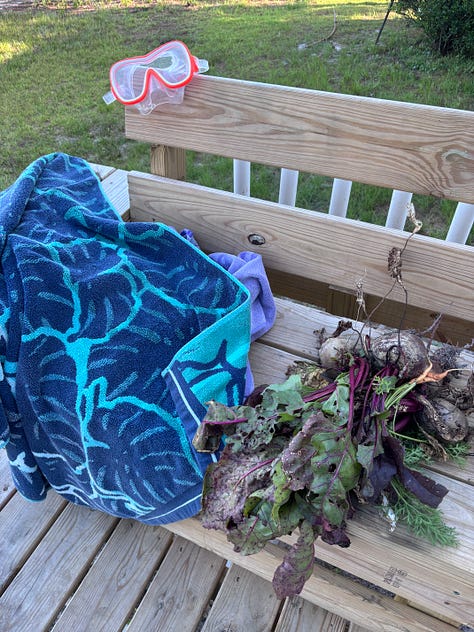
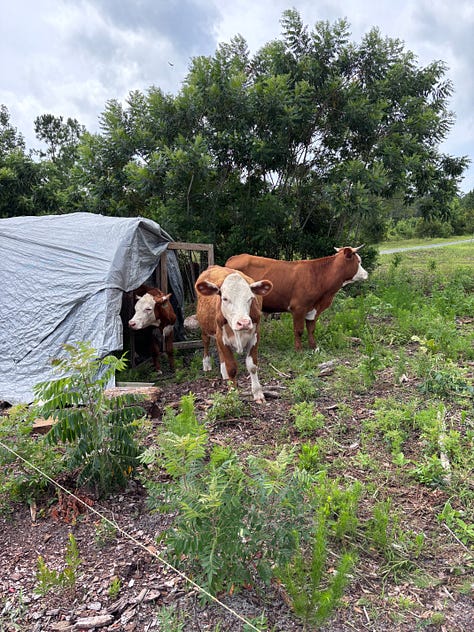
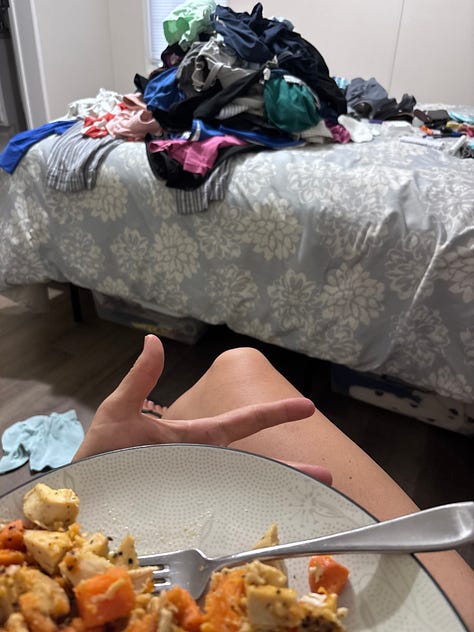
Listening: This podcast episode about DARVO, this episode with my friend
, this episode about spiritual abuse, and this album.Reading: Talked a lot about books already, but I appreciated this piece from
. I was also so excited to see that has started a Substack, and enjoyed her first letter. TBR… I’m thinking of re-reading the James Herriot books, partially for the story, partially for any ancillary vet knowledge.Trying: I love the kids’ artwork but get sick of it just sitting in piles. We’re experimenting with those little clothespins and twine to make flexible displays. We have a kitchen “gallery” and then one in each bedroom. I’m hoping it’ll encourage them to make beautiful things. Alternately, I might end up with a wall full of army airplanes and explosions…
You should always look up quotations in your actual books, because sometimes then you get to discover (again) the larger setting of a quote, which in this case is the very end of Mere Christianity (Book IV, chapter 11, pg. 226 in my edition), and has been one of my favorites since HS when we all put quote sections on our Facebook profiles:
“Even in literature and art, no man who bothers about originality will ever be original: whereas if you simply try to tell the truth (without caring twopence how often it has been told before) you will, nine times out of ten, become original without ever having noticed it. The principle runs through life all from top to bottom. Give up yourself, and you will find your real self. Lose your life and you will save it. Submit to death, death of your ambitions and your favorite wishes every day and death of your whole body in the end: submit with every fibre of your being, and you will find eternal life. Keep back nothing. Nothing that you have not given away will be really yours. Nothing in you that has not died will ever be raised from the dead. Look for yourself, and you will find in the long run only hatred, loneliness, despair, rage, ruin, and decay. But look for Christ and you will find Him, and with Him everything else thrown in.”
Just dive through Sarah Mackenzie’s Read Aloud Revival archives if you need reasons! I also always appreciate her booklists and resources for planning. Amber O’Neal Johnston at Heritage Mom offers another set of amazing booklists that I have used and will continue to reference.
When you go to the library, your kids look through books, but YOU pick what comes home. I really loved one of our library setups, because there were a bunch of toys and blocks etc… so the little kids would play with those while I could look through books with the baby in the carrier. The kids make a pile of books they find, but I often veto things that look iffy, are annoying, or I just don’t want to read out loud. As they get older they have more latitude. My older boys often just go for a repeat of nonfiction picture books about animals, dinosaurs etc… and then I pick out picture books. I also do usually skim through the whole thing if it’s new to me or I don’t know the author.
And they keep coming up with more! I’ll keep it going until it’s un-fun or I run out of books, whichever comes first.
There is just no way around the fact that homeschooling with a mobile (he’s crawlinnggggg)—18 month old kid is a whole thing.









Yes please to book recommendations! And I'm all ears for any tips on home educating with a mobile baby.
I love this so much. I hope I never forget the difference I saw in my students when I switched from teaching religion to English. Suddenly, in my English classroom, students were much, much, much more willing to have an open and honest conversation about spirituality, morality, doubt, faith, calling, service, etc. than they ever were in my religion classroom. I truly believe that was the power of the story, holding up a mirror that allowed them to think critically about the kind of people they wanted to be in light of the people we were reading about.
I'm working my way through Everything Sad is Untrue right now too and absolutely loving it. So glad the ladies at Reading Revisited are hosting a conversation about this book -- I need to process it with others! <3